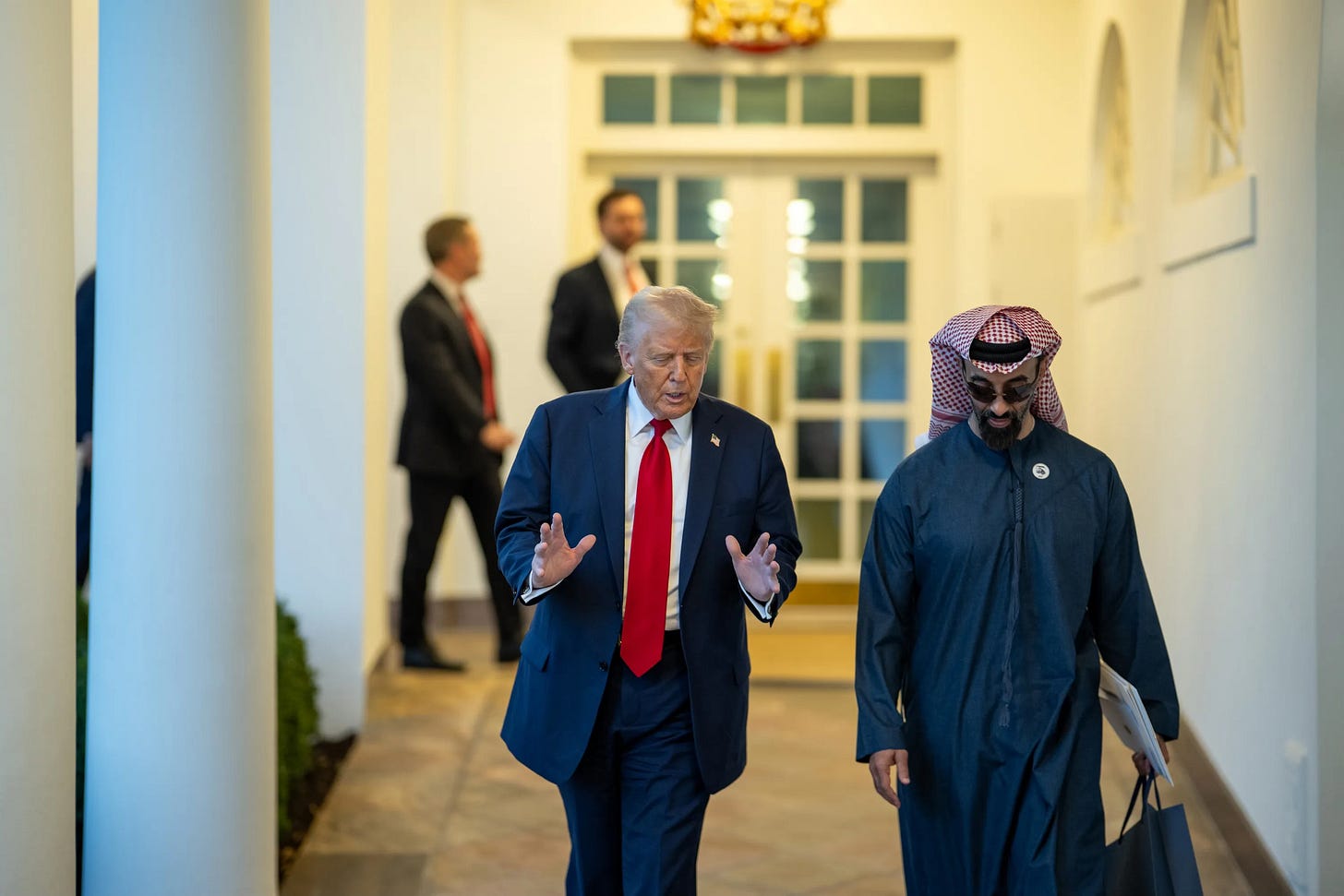Tech is turning the Middle East into a pivotal region
War, conflict and the past are out; growth, prosperity and the future are in
It can be hard to see the forest from the trees in a region with ever fewer of them. It’s even harder amid the theatrics of Trump’s trip to the Middle East last week; from the upscale mobile trailer McDonald’s deployed by Saudi Arabia to the hair-flipping dancers who greeted him in the United Arab Emirates and the hand-me-down “flying palace” jet offered to him by Qatar, every stop was so absurd and so galling and yet so well-executed that credit must be offered where credit is due. These are all leaders who understand Trump’s id.

They also understand his ego and desire for superlatives, which were delivered in spades. By the White House’s official tally, Trump won trade deals worth $600 billion with Saudi Arabia, $1.2 trillion with Qatar and a far clunkier $200 billion with the United Arab Emirates plus acceleration of the “previously committed $1.4 trillion” the Emirates made to Trump earlier this year. The White House’s conclusion? Trump is “bringing the total of investment agreements in the Gulf region to over $2 trillion.”
We could walk through the fact sheets of each of these trade deals, where we’d surely pause to point out that under the title, “NEVER TIRED OF WINNING” (yes, in all caps), the White House boasted that “While it took President Biden nearly four years to secure $1 trillion in investments, President Trump achieved this in his first month, with additional investment commitments continuing to roll in.” We might even be cynically keen to point out that Qatar has an estimated GDP of $213 billion, and thus is committing six years of its entire productivity to these newly-announced U.S. deals.
Forest. Trees. If you’re seeking water in the desert, or in this case, trade surpluses in a world of deficits, you are going to run toward the shimmering mirage of extraordinary economic growth powered by petrodollars and petrokingdoms. Yet, the occasional mirage does turn out to be a crucial oasis.
Trump’s first foreign trip of his second term was theater at its finest, and what matters aren’t the minutia of how much Qatar is investing into U.S. quantum technologies ($1 billion, by the way), but rather the playwrights’ overarching narrative. Here, it’s simple: the Middle East is open for business, it has terrific wealth at its disposal, it’s ambitious and ready to go, and the war-torn and conflict narratives of the past need to be exchanged for new ones focused on future growth and prosperity. The headline numbers may be unfathomable and unattainable, but the intentions are certainly not.

The region has changed, recently and dramatically. A top former U.S. Middle East official (and one who doesn’t work for us, by the way) argued last week with me that the region is simply “tired” from decades of wars. The chaos engineering that was the linchpin of Middle East state-to-state affairs is coming to a close following the destruction of Hezbollah, the overthrow of Assad in Syria, the deepening precarity of Iran and the civil war in Yemen.
That’s increasingly in the past. Now, artificial intelligence and its voracious appetite for all forms of energy is animating the dreams of a younger generation of political leaders who can envision themselves at the fulcrum of global power through the ones and zeros of training and inference rather than the dollars and cents of barrels. The Islamic world once protected the great intellectual works of Europe, shepherding the great Greek classics of philosophy and mathematics through the Dark Ages. Why not again?
Indeed, while the usual oil barons made their appearances, what was striking was who else was in tow for Trump’s visit. AI royalty like Sam Altman of OpenAI, Jensen Huang of Nvidia, Andy Jassy of Amazon, Elon Musk, Reid Hoffman, Ruth Porat of Alphabet and more all joined at various points, announcing deal after deal in a (dry) bacchanalia of tech investment.
Quantum tunneling seemed more likely to be discussed than oil pipelining. Isn’t that refreshing?
Not in Washington, apparently. I was in DC last week for interviews and our first Riskgaming meetup (you should have been there!), and outside the hilarious yet cynical jokes about Qatari Force One, the constant refrain was “Yes, but what about” this conflict or that conflict, these human rights abuses, this risk of war or that terrible nuclear deal. Generations of diplomats have come through a system that has always viewed the Middle East through the lens of violence. Journalists too run toward bloodshed, with the profession’s “if it bleeds, it leads” ethos. As one typical journalist puts it in their bio, they cover the region’s “conflicts, crises, cultures and socioeconomic trends.” What about its new economy?
The Middle East is trying hard to move on, even as our thinking is not. It wants to be taken seriously as an economic power that extends beyond oil. That’s not hard for the private sector, where dealmakers, entrepreneurs and institutions ranging from New York University to the Louvre have descended in droves for more than a decade to secure funds to power their ambitions. It’s the old, recalcitrant guard at Foggy Bottom, the Pentagon and along Embassy Row that seems impossible to evolve.
The most obvious example of this split is over the AI deals at the center of Trump’s trade mission. Among friends, the most caustic comments last week came after Trump reneged on the Biden administration’s last-minute AI diffusion rule, allowing the Middle East carte blanche access to America’s best chips, many of which will likely at least partially power Chinese AI training and inference in the future.
The DC Blob must now confront a new Middle East, one that will not be cowed nor bullied into flinging off Chinese entreaties in its pursuit of advanced development. In fact, even with the inducements of defense hardware, the United States lacks the leverage to ban future AI workloads that the Middle East desperately seeks to cultivate.
Talking with others in DC last week, the biggest concern wasn’t turning the Middle East into an economic success story — that seemed to be widely supported in a cross-partisan way. The deeper worry was a lesson from history: will the Middle East follow the path of China and modernize without ever loosening its authoritarian politics? Or worse, could the region one day become its own rival to American industrial and economic power?
After all, the goal of America acceding to China’s accession to the World Trade Organization back in the late 1990s was to encourage Chinese prosperity in the hope that a burgeoning bourgeoisie would undermine the Communists and eventually lead to, if not liberal democracy, then a close equivalent. Any such momentum peaked in 2008 with the launch of Charter 08 but ultimately receded, and has now been firmly squashed by Xi Jinping.
A lesson from history, perhaps, but also a poor analogy. Saudi Arabia has a population just above 32 million, with almost two-thirds under the age of 30. Qatar has just 313,000 citizens out of a population of 2.6 million, the remainder migrant labor. The UAE is even more extreme, with roughly 1.4 million citizens out of a population upwards of 11 million. This is not a region where labor power is anywhere near China’s. Even in the most ambitious automation fever dream, the Middle East isn’t going to be the factory of the world taking whatever Midwest jobs remain.
The trio are also not developing countries, at least, in any simplistic definition of the term. Even today, China has hundreds of millions of people who have emerged from abject poverty but are still deeply poor by global standards. By contrast, this trio have no resource constraints on offering a top-flight quality of life to their (citizen) populations. Consent can be obtained with cash, and that affords these governments — if they so wish — much more flexibility when it comes to internal security.
I know it’s hard to give up the narratives that have been leading the headlines, think tank reports and textbooks for decades — I’ve read many of them myself. But it’s well past time to update our priors: the Middle East has become the critical fulcrum of the world and is an emerging tech power. It can potentially fund the future dreams of entire nations at its pleasure, and it will skillfully leverage its centrality to secure its own future in the process. The Chinese have understood this for a long time, and there are some Americans who do as well. But that’s not the norm, and that has to change. For the forest in the Middle East has changed — and it’s a tropical paradise inside an air-conditioned biodome zoo in Dubai.






We have become static, most of us content to see the world as a linear place, comfortable in the illusions of what we think is true and what must never change.
Thank you for broadening my horizons!
AI is as much a new Industrial Revolution as it is software. Arguably the infra layer of the ai stack—the Industrial Revolution part of it—is more important than the more well known software layer (ChatGPT et al). Without the industrial infra layer the software wouldn’t have the compute scale it requires to work as well as it does.